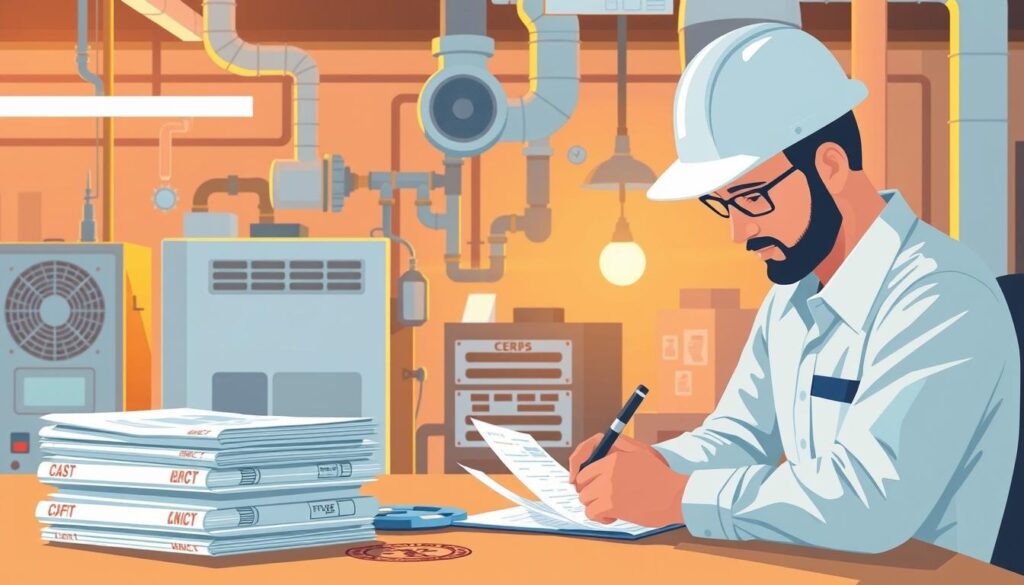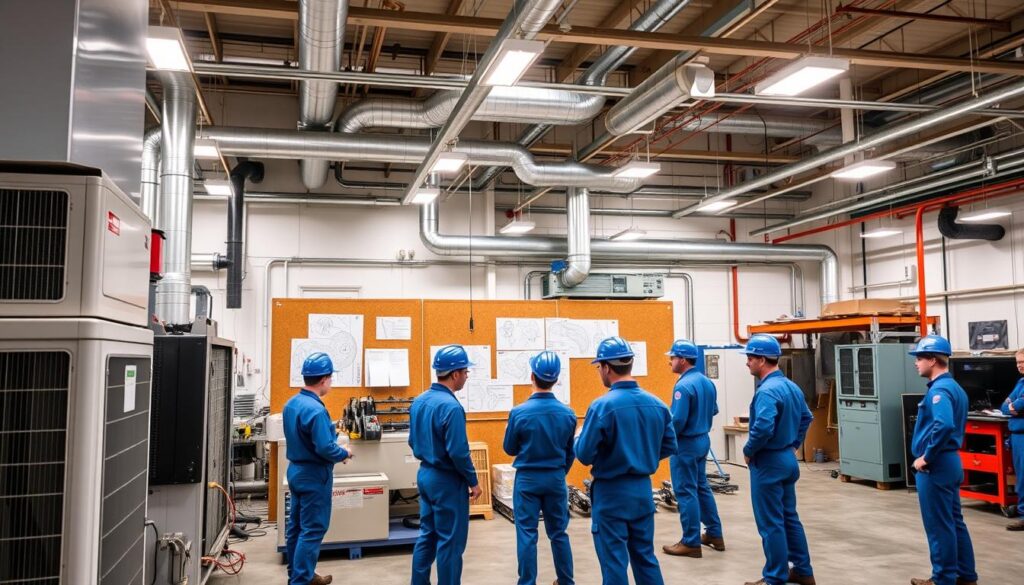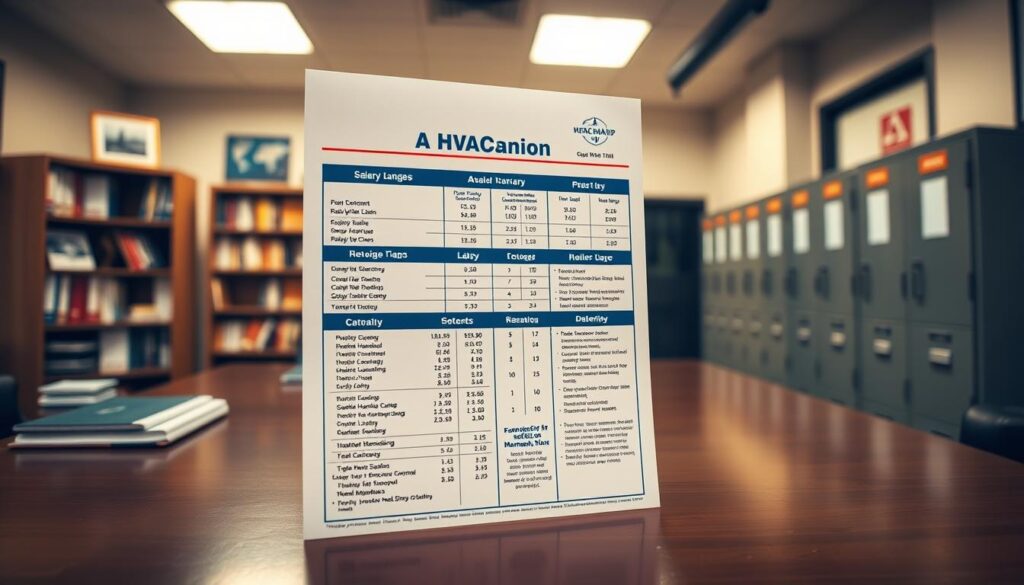Affiliate Disclosure
HVAC Guide Guys is a participant in the Amazon Services LLC Associates Program, an affiliate advertising program designed to provide a means for sites to earn advertising fees by advertising and linking to Amazon.
How to Apply for HVAC Union? Are you ready to unlock a world of professional opportunities and job security in the HVAC industry? Joining an HVAC union could be your ticket to a stable and rewarding career that offers more than just a typical job.

HVAC technicians play a critical role in maintaining comfort and safety in residential and commercial spaces. By learning how to apply for HVAC union membership, you can access incredible benefits that go far beyond standard employment opportunities.
The hvac union membership application process might seem complex, but with the right guidance, you can navigate the path to becoming a union member smoothly. This comprehensive guide will walk you through every step of joining an HVAC union, helping you make an informed decision about your professional future.
Key Takeaways
- HVAC unions provide substantial career advancement opportunities
- Union membership offers job security and competitive wages
- Professional training and certification are integral to union membership
- Application processes vary by local union chapters
- Apprenticeship programs are crucial for skill development
Table of Contents
Understanding HVAC Unions and Their Role
HVAC unions are key in helping heating, ventilation, and air conditioning workers. They offer a strong support system. This is great for those looking to join HVAC unions in the U.S.
These unions help workers grow in their careers. They also help in getting better work conditions and access to important resources.
Types of HVAC Unions Available
HVAC workers have many union options to choose from:
- United Association of Plumbers and Pipefitters (UA)
- Sheet Metal Workers’ International Association
- Local trade unions in specific metropolitan areas
- Regional HVAC professional associations
Benefits of Union Membership
Being part of a union comes with many benefits:
- Higher wages
- Good health insurance
- Retirement and pension plans
- Training and skill development
- Job security
“Union membership transforms a job into a sustainable, long-term career path for HVAC professionals.” – HVAC Industry Expert
Union vs Non-Union Work
Union and non-union jobs differ mainly in support and working conditions. Union members often have better career paths, training, and negotiation power for wages and benefits.
Joining a local union can boost your career. It offers networking, skill growth, and job stability in the HVAC field.
Essential Prerequisites for HVAC Union Application
Starting a career in HVAC through a union needs careful planning. You must first understand the important steps for joining. To succeed, you need to meet certain educational and personal standards.
Before you apply to an HVAC union, make sure you meet these key qualifications:
- High school diploma or equivalent GED certificate
- Minimum age requirement of 18 years
- Valid driver’s license
- Passing a basic math and mechanical aptitude test
- Physical fitness to perform demanding technical work
Educational background is key for HVAC union apprenticeships. Technical schools and community colleges offer programs that help. These programs teach you about electrical systems, refrigeration, and heating technologies.
| Prerequisite | Minimum Requirement | Recommended |
|---|---|---|
| Education | High School Diploma/GED | Technical HVAC Certificate |
| Age | 18 years | 19-25 preferred |
| Physical Fitness | Basic strength requirements | Excellent physical condition |
Your personal traits are as important as your technical skills. Strong problem-solving abilities, mechanical aptitude, and a desire to learn are essential. Employers and union representatives seek candidates who are reliable, team-oriented, and passionate about the trade.
Preparation is the key to unlocking opportunities in the HVAC industry.
Explore Our HVAC Shop
Looking for top-rated HVAC tools, parts, and accessories? Visit our shop and find the perfect solution for your needs.
Visit the ShopHow to Apply for HVAC Union
Understanding the UA local union application steps is easy once you know the process. Joining an HVAC union can lead to great career opportunities and growth in the trade field.
Before you start applying for HVAC union, it’s important to prepare well. Knowing the key steps is crucial.
Finding Local Union Chapters
Finding the right UA local union takes some research. Here are ways to find your nearest chapter:
- Visit the United Association (UA) official website
- Contact local trade schools for recommendations
- Search online union directories
- Attend regional trade job fairs
Required Documentation
Having your application packet ready is key for union membership. Make sure you have these documents:
- High school diploma or GED certificate
- Proof of age (18 years or older)
- Valid government-issued identification
- Academic transcripts
- Work experience records
Application Submission Process
Each UA local union has its own application process. Here are some general steps:
| Step | Action |
|---|---|
| 1 | Complete union application form |
| 2 | Submit required documentation |
| 3 | Pay application fee |
| 4 | Attend interview or assessment |
| 5 | Wait for acceptance notification |
Being persistent and well-prepared is important when applying to HVAC unions. Your hard work will greatly increase your chances of getting in.
HVAC Union Apprenticeship Requirements

Starting an HVAC union apprenticeship can lead to a fulfilling career. These programs mix hands-on experience with classroom learning. This combination prepares you well for a career in heating, ventilation, and air conditioning.
To join, you need to meet certain requirements. These programs last three to five years. They offer a deep dive into HVAC skills, more than what you learn in school.
- Minimum age requirement: 18 years old
- High school diploma or equivalent
- Basic math and algebra skills
- Physical fitness for demanding work
- Clean driving record
Pipefitters union HVAC programs are great for getting practical experience. You’ll work with seasoned pros. You’ll learn key technical skills and industry standards.
| Training Component | Typical Hours/Duration |
|---|---|
| Classroom Instruction | 144 hours per year |
| On-the-Job Training | 2,000 hours per year |
| Total Program Length | 3-5 years |
Your apprenticeship will cover tough technical training and safety. You’ll also learn specialized skills. After finishing, you’ll be certified and ready to shine in HVAC.
Explore Our HVAC Shop
Looking for top-rated HVAC tools, parts, and accessories? Visit our shop and find the perfect solution for your needs.
Visit the ShopEducational Requirements and Training Programs
To get an HVAC union certification, you need a solid education and training plan. You’ll learn in classrooms and get hands-on experience. This mix prepares you well for a career in HVAC.
HVAC training lasts from six months to two years, based on your chosen path. These programs teach you the key skills and knowledge for the HVAC field.
Classroom Training Components
In class, you’ll learn about important HVAC topics:
- HVAC system theory and design
- Electrical systems and circuits
- Refrigeration principles
- Safety procedures and regulations
- Energy efficiency techniques
On-the-Job Training Hours
Getting practical experience is key for HVAC certification. Most programs need:
| Training Level | Required Hours |
|---|---|
| Apprentice | 2,000-4,000 hours |
| Journeyman | 4,000-8,000 hours |
Required Certifications
To finish your HVAC certification, you must get certain certifications:
- EPA Section 608 Certification
- State-specific HVAC licensing
- Specialized technical certifications
“Investing in your HVAC education is the first step toward a rewarding and stable career.” – HVAC Industry Expert
Remember that each union may have slightly different requirements, so always check with your local union chapter for precise details about their HVAC union certification process.
Union Membership Costs and Fees
Joining an HVAC union comes with financial steps you need to know before applying. The costs can change based on your local union and what they need from you.
Common fees for HVAC union membership are:
- Initial application fee: $50-$250
- Annual membership dues: $200-$500
- Apprenticeship registration costs: $100-$300
There might be extra costs for training materials and safety gear. Some unions help by offering payment plans for apprentices.
Think about the long-term gains:
- Higher hourly wages than non-union jobs
- Good health insurance
- Retirement and pension plans
- Opportunities for ongoing learning
Pro tip: Many unions offer financial help or scholarships for apprentices. This can help cover the costs of joining.
The state contractor’s license is another cost, usually between $100 and $500. Getting this license shows you’re serious about your career and opens more doors in the HVAC field.
Explore Our HVAC Shop
Looking for top-rated HVAC tools, parts, and accessories? Visit our shop and find the perfect solution for your needs.
Visit the ShopCareer Advancement Opportunities in HVAC Unions
HVAC technician union jobs offer great chances for career growth. You can move from an entry-level position to more advanced roles. This path helps you grow both personally and professionally in the field.
Being part of a union opens up structured career paths. Your hard work and skills can lead to exciting roles in HVAC.
Journey Worker Status
Becoming a journey worker is a big achievement for HVAC technicians. It shows you’ve:
- Mastered technical skills
- Gained deep industry knowledge
- Completed the required apprenticeship hours
- Passed certification exams
Leadership Positions
HVAC unions offer many ways to move into leadership roles. Experienced technicians can become:
- Shop stewards
- Union representatives
- Training coordinators
- Safety inspectors
Specialization Paths
Expanding your skills can boost your career in HVAC union jobs. Look into specialized areas like:
| Specialization | Key Focus | Potential Opportunities |
|---|---|---|
| Commercial Refrigeration | Advanced cooling systems | Industrial and large-scale projects |
| Energy Efficiency | Sustainable HVAC solutions | Green technology implementation |
| Industrial HVAC | Complex mechanical systems | Manufacturing and processing environments |
Your union membership helps you keep learning and improving. This ensures you stay ahead in the changing HVAC world.
Understanding Union Pay Scales and Benefits

Joining an HVAC union opens up a world of financial benefits. You get competitive wages and a comprehensive compensation package. This makes union workers stand out from those who aren’t part of a union.
HVAC union members can earn between $45,000 to $85,000 a year. Several factors influence this:
- Where you live
- How long you’ve been working
- Any special certifications you have
- Your skill level and expertise
But it’s not just about the money. Union members also get great benefits. These include:
- Good health insurance
- Retirement and pension plans
- Paid time off for vacation and sick leave
- Chances to keep learning and growing professionally
- Protection from job loss
“Union membership turns your job into a career with long-term financial stability.” – National HVAC Trades Association
Being in a union means you get set pay rates through contracts. These deals ensure you get regular raises and protect you from unfair pay changes. Union jobs offer clear career paths and financial security, unlike non-union jobs.
Choosing to join a union means investing in a career with steady growth and financial stability. You’ll also get recognition in the HVAC field.
Explore Our HVAC Shop
Looking for top-rated HVAC tools, parts, and accessories? Visit our shop and find the perfect solution for your needs.
Visit the ShopCommon Challenges and How to Overcome Them
Joining an HVAC local union has its own set of challenges. These can test your determination and resilience. Knowing these obstacles can help you succeed in joining a union.
Getting into an HVAC local union is competitive. There are only a few spots for apprentices. To stand out, focus on:
- Exceptional technical skills
- Strong educational background
- Demonstrated commitment to the trade
- Professional networking
Managing your time is key during your apprenticeship. Many successful union members suggest making a schedule that balances work and study.
“Success in the HVAC union is about persistence and adaptability” – Local 537 Union Representative
Adapting to the union’s culture is another challenge. Union environments have their own ways of communicating and expectations. Building strong relationships and showing respect for others can help you fit in.
Working in HVAC can be physically demanding. Technicians face extreme temperatures and conditions. Staying fit and mentally prepared is essential for success.
- Stay physically conditioned
- Invest in quality protective gear
- Practice proper safety techniques
- Continuously upgrade your skills
By understanding these challenges and preparing well, you can thrive in your HVAC union career.
Conclusion
Starting a career as an HVAC technician through union membership is exciting. It opens doors to great opportunities. Learning how to apply for HVAC union membership is your first step. It leads to a stable, well-paid job in a dynamic field.
Getting into this career takes hard work and dedication. You need to plan well, meet educational needs, and go through the application process. Each step brings you closer to a fulfilling career.
Union HVAC technician jobs offer great training, good pay, and job security. This makes it a great choice for those who love technical skills and want to grow professionally.
For technical professionals aiming for long-term success, union membership is a big plus. By understanding the application process and improving your skills, you can build a strong career in HVAC. Look into local union chapters, get your documents ready, and take action to join this promising field.
Remember, staying persistent and always learning is crucial in the HVAC union world. Face challenges, stay committed to your growth, and you’ll lay a strong foundation for a successful career in this important trade.

